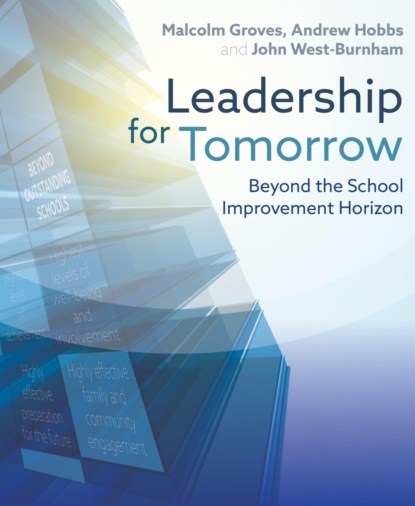Həcm 300 səhifə
0+
Leadership for Tomorrow

Kitab haqqında
In Leadership for Tomorrow: Beyond the School Improvement Horizon Malcolm Groves, Andrew Hobbs, and John West-Burnhampresent a vision-led analysis of what needs to change if schools are really to equip children and young people to thrive in our ever-changing world.Continually adding improvements to existing models of schooling isn't enough: we need a more radical reconceptualisation of schooling's function and purpose. We need school leaders who can look beyond the horizon and lead on the strength of lessons learned from the here and now. In Leadership for Tomorrow Groves, Hobbs, and West-Burnham expertly examine what needs to change if we are to lead our schools beyond today's limited school improvement horizon, and explore the nature of the change leadership which can make this happen. Rooted in the direct experience of innovative and successful school leaders, Leadership for Tomorrow presents a wide range of strategies and case studies that will enable and inspire leaders to future-proof their school improvement approach and to fashion better futures for the children and young people in their care. Furthermore, by sharing their research-informed insight into and vision for – the evolving nature of education, the authors hope to encourage leaders to go further in building both their own and their school's capacity to live, learn, and grow successfully. Split into three parts that interweave both theory and practice, Leadership for Tomorrow poses a number of questions throughout to stimulate thinking about current and emerging issues in education and argue that consequent responses will vary in different contexts. Part One sets out and justifies theoretically the principles and values that underpin the authors' vision for education, and signposts the evidence which highlights the limitations of short-term thinking and the reasons for why it is destined to fail. In Part Two the authors focus on more practical matters by presenting case studies of five school leaders to examine their work through the lens of the four-quadrant Schools of Tomorrow Framework, which depicts the 'beyond outstanding' school as one that delivers highly effective family and community engagement and preparation for the future, as well as the highest levels of achievement and of well-being and involvement. Part Three then blends theory and practice with an in-depth analysis of what these leaders' experiences can tell us about developing new understandings of leading change and school improvement for the future, which are at one and the same time values based and evidence informed. Leadership for Tomorrow is the result of nearly a decade of thinking, research, and observation of leadership practice which Groves, Hobbs, and West-Burnham have undertaken in a range of settings; the authors have written up some of this experience previously for Schools of Tomorrow (SoTo) a small research and development group made up of school leaders working together to shape a better future for their schools. Whilst Leadership for Tomorrow is primarily focused on changes within the English educational system, the authors hope that the lessons derived from the book's content will be of interest to leaders in other school systems too. Suitable for school leaders, those preparing for leadership, and those with an interest in leadership development and policy.
